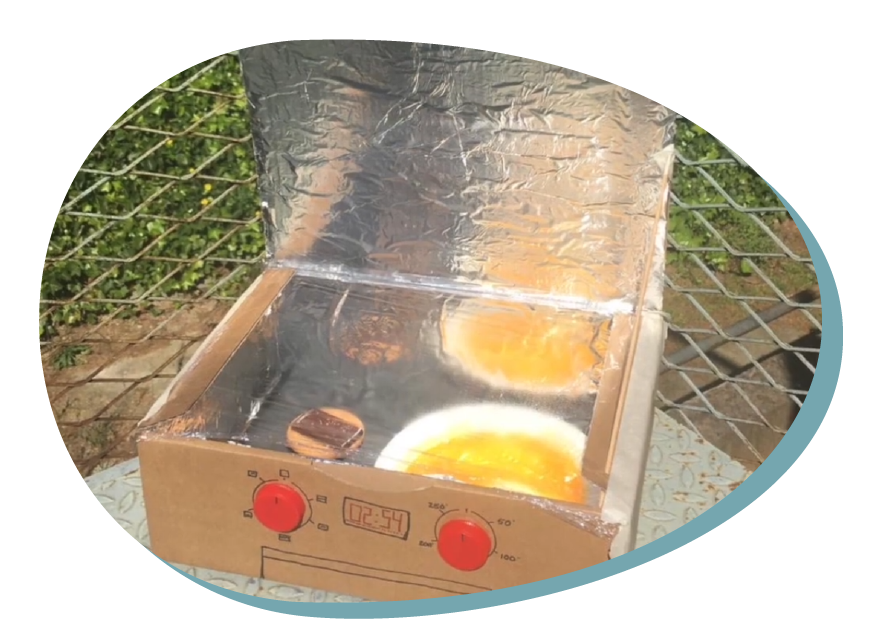Cooking with a solar oven
Type of resource: website
Web address https://desertchica.com/diy-solar-oven-smores-kids-science-experiment/
Language: English
Description
– Constructing the simple oven
– Investigating the consteruction and functions of the oven
– Observing how sun heat influences the food
Scientific concept introduced
– Experiment
– Heat
– Oven
– The process of melting
Creative and critical thinking
–
Mathematical reasoning
Measuring
Scientific thinking
– Asking questions
– Analyzing and solving problems
– Predicting
– Conducting research
– Drawing data-based conclusion
Learning how to learn
– Learning to work in a team (sharing ideas, following the rules of safety)
– Fine motor skills
Additional
Cooking with a solar oven
Overall aims
Extending knowledge of concepts related with heat, food melting
Exploring the construction of oven – understanding the functions of oven
Developing cognitive abilities like: perception, thinking and observation, drawing conclusions
Organizing the environment for cooperation
Vocabulary – keywords should be understood
Experiment, heat, oven, the process of melting
Expected learning outcomes (operational aims)
To explain concepts of melting
To explain the structure and functions of oven
To draw the data-based conclusions from observation
To construct own model of oven
To cooperate in a team
STEM skills – to which the learning unit is related to
CORE STEM SKILLS
Learning to think and discover
Scientific thinking:
– asking questions
– analyzing and solving problems
– conducting research
– drawing data-based conclusions
Mathematical reasoning:
– measuring
ADDITIONAL SKILLS
Learning to work in a team:
– sharing ideas
– following the rules of safety
Fine motor skills
Teaching methodologies/activity outline
1. Introduction – activating the previous knowledge concerning oven.
Questions:
What is oven?
How doe it work? Why do we put the dishes into the oven?
What else is needed for the dish to bake?
2. Building the model of oven following the instruction presented on the website: https://desertchica.com/diy-solar-oven-smores-kids-science-experiment/
3. Discussion points after observing the results:
– The sun as a heat source
– What would happen if you used different color construction paper
– What’s the purpose of the foil
– The purpose of the plastic wrap
– How various weather conditions would affect the result?
Assessment of learning
Teacher ongoing observation and questions.
Equipment and materials to be used in learning unit (tools, ingredients etc)
– Cardboard pizza box
– Aluminum foil
– Plastic wrap or bag
– Black construction paper
– Tape
– Glue stick
– Pencil or wooden skewer
– Scissors or utility knife
– S’mores supplies: chocolate, graham crackers, marshmallows (or other ingredients to prepare desert)
Kind of setting
Preschool classroom or kitchen, and then the outside place preschool garden)
High temperature needed – the experiment can be conducted during summer.
References – source
https://desertchica.com/diy-solar-oven-smores-kids-science-experiment/
Cooking with a solar oven
1. Usefulness for STEM education – integrating content of different disciplines
Cross-curricular character of the resource

The range of S-T-E-M subjects included

The presentation of possibilities of including artistic activities (STEAM approach)

2. Expected learning outcomes
Consistency (links) with preschool core curriculum

Communicativeness of description

3. Methodology of teaching
Clarity, communicativeness of instructions for teachers

Meaningful learning – using practical life problems

Original idea

The level of ease in implementing the methodology to preschool age children

The level of ease in preparing necessary ingredients, materials and equipment needed

4. Sustainability
Ecological characteristics of materials/ results

Supporting healthy eating habits

Low ecological footprint

Possibilities of inclusion (respecting cultural diversity and food intolerances)

5. Class management
Using differentiated forms of work – individual, team work etc.

Individual work

Team work

Whole group
6. Time management

Short activity (10-15 minutes)

Medium activity (20-30 minutes)

Long activity (1 hour or more)

Very long activity (1 day or more)
PDF: PDF: https://www.printfriendly.com/p/g/APq3EH

